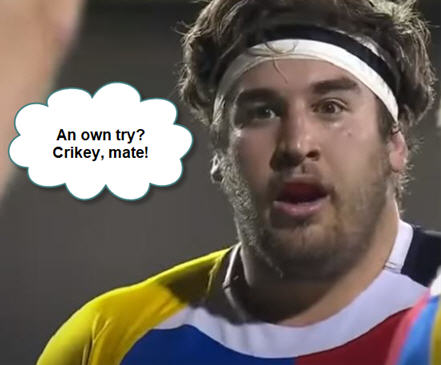You can score own goals in other sports, but can you kick an own goal in rugby? And if you touch the ball down over your own try line, is this an own try?
Let’s look at what happens in both scenarios. The question about the try is more straightforward so we’ll address that first.
And I’ll also show you the only own try ever awarded in rugby!
Can You Score An Own Try In Rugby?
Players cannot score an own try in rugby. When players touch the ball down within their in-goal area, the opposition team is awarded a five-meter scrum.
This scenario often happens when players from both teams are chasing a kicked ball that bounces or rolls over the try line.
A team will always prefer to concede a five-meter scrum over allowing the opposing team to touch the ball down for a try.
Penalty tries
When a team infringes in a way that prevents a try from occurring, the opposition is awarded a penalty try.
You could consider this to be an “own try”. But nobody really thinks of it that way in rugby.
In soccer, the results will record an own goal against the name of the unfortunate scorer. In rugby, the penalty try isn’t recorded against the player who infringed.
The Only Own Try Ever Scored In Rugby

Now I’m going to explain the only own try ever scored in rugby.
But wait! Didn’t I say that this couldn’t be done?
Well, the exception occurred when both the referee and the TMO (television match official) made one of the biggest refereeing howlers you’ll ever see.
The match was between two Australian clubs, the North Harbour Rays and the Sydney Stars.
There was a ruck on the try line. A defender ripped the ball away from the attacking team and ended up flat on the deck.
He squirmed back toward his own try line and dotted the ball down.
This should be a five-meter scrum to the opposition.
Referee shocker
The referee hasn’t noticed that the hands are from the defending team. He asks the TMO to adjudicate on whether the ball was grounded. The TMO also doesn’t notice!
Try awarded! The unfortunate team on the wrong side of this decision went on to lose the match.
Here’s the video clip. The look on the defender’s face is priceless. As are the disbelieving laughs from the commentators.

Can You Kick An Own Goal In Rugby?
A drop goal is only awarded in rugby when the ball is kicked through the opponent’s goalposts. This means that kickers can’t score an own goal.
If the ball passes through the kicker’s goalposts, the consequences are the same as if the player kicked it across their own try line at any position.
If the ball goes out of play, then the opposition is awarded a five-meter scrum. This is because the team in possession has put the ball over their own try line and out of play.
A five-meter scrum is also awarded if the kicker or a teammate gathers the ball and touches it down in the try-scoring zone.
The worst outcome for the kicker is if an opposition player gathers the ball and touches it down in the try-scoring zone. That player is awarded a try.
Is It Possible To Kick The Ball By Mistake Through Your Own Posts?

Let’s assume that the kicker hasn’t completely lost his bearings and mistaken his own posts for those of the opposition.
There are two other scenarios where the event would most likely occur. I’ve never seen either scenario in real life, so this is speculation on my part!
Sharp gust of wind
In this scenario, the kicker is deep within his own twenty-two and wants to clear the ball. He may even be behind the try line if there’s a ruck near the line.
We have an article on whether rugby players can kick the ball backward. There’s a section on a high ball traveling backward due to a sharp gust of wind.
Ricochet from a charge down
If the kicker is near his try line and in front of the goalposts, he’s a target for the opposition to attempt to block his kick.
If you want to know more about charge downs, check out our article on blocking kicks in rugby.
For our purposes, just imaging the ball rebounding from the opposition player’s hands and flying up and backward over the kicker’s goalposts.
Regardless of how high the ball goes, the opposition player will ignore the sting in his hands and race forward to try to touch the ball down for a try.
Metaphorical Own Goals
I’ve already mentioned penalty tries. The team awarded the try used to have to kick the goal conversion. But nowadays the full seven points are awarded.
You could consider this as an own goal. However, nobody in rugby sees it that way!
But if you are of a philosophical bent, you could also stretch the concept to cover stupidity by the kicker.
This would be if the kicker did something really inept that allows the opposition to score a droppie.
How about slicing a clearance kick straight into the hands of the opposition flyhalf, who gleefully kicks a drop goal? I’ve seen this happen in a club match.
However, this is generally seen as great skill by the scoring player who has very little time to steady themselves for the unexpected opportunity!